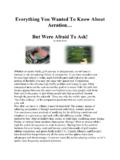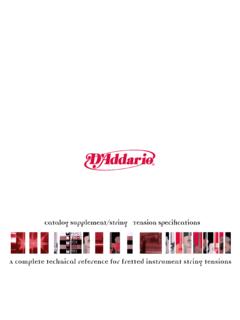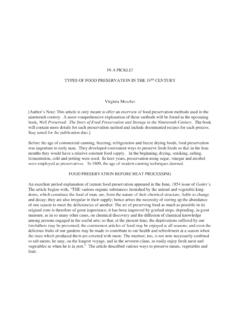Transcription of EVER SO SLIGHTLY - All Souls Church
1 ~ 1 ~ 2015 Galen Guengerich EVER SO SLIGHTLY A sermon preached by Galen Guengerich All Souls Unitarian Church , New York City September 13, 2015 Let me begin by saying out loud what is by now obvious to everyone: Alejandro Hernandez-Valdez is in the house. Today begins a journey of music and spirit that those of us on the music director search committee have eagerly awaited for months. And I should also say out loud what s been obvious for a year, but now in a new way: Ren e Anne Louprette is in the house. After a year as interim organist, Ren e now begins her service as associate music director. As those of us involved in these searches know full well, Alejandro and Ren e are two of the most talented and accomplished Church musicians of their generation. We are exceedingly fortunate to have them with us at All Souls . Along with our superb choir, they will lead our music for years to come. My hope is that our enthusiasm about All Souls and its future, as well as our financial support of this high level of excellence, will be equal to the promise their talents represent.
2 Beginning later today, our ministerial search committee will convene a wide-ranging consultation with you about the ministry position vacated last spring by Lissa Gundlach, who now serves as senior minister of Neighborhood Church in Pasadena. I hope you will engage fully with this process. While the successful candidate will initially be hired as an Assistant Minister, the Board of Trustees and I hope that broad congregational participation in the search will enable you to vote the minister into an associate role within a couple of years. In addition, beginning next month, the Board of Trustees will invite you to participate in a visioning process. They will ask you to imagine the future of All Souls as we approach our 200th anniversary in 2019. While the board and I have specific responsibilities in leading our spiritual community, we share a commitment to a future all of us imagine together. As with the ministerial search process, I hope you will engage fully with the visioning process.
3 All Souls is a congregation on the move. We will decide together where to go, of course, but the terrain through which we will move has become increasingly well-mapped. During my time out of the pulpit in July and August, I completed the initial manuscript of a new book about spiritual practice for a secular age. I describe our age as secular not because no one believes in God or goes to Church , but because people now have a choice in these matters. Today, more and more people are choosing not to believe and not to participate. Whether this trend is good news or bad news, and whether or not anything can or should be done about it, isn t the topic of my book. Rather, my interest is a related trend. ~ 2 ~ 2015 Galen Guengerich According to the US Religious Landscape Survey published two years ago by the Pew Research Center, the fastest-growing category in their survey comprises individuals who describe themselves as spiritual but not religious.
4 At present, more than one-quarter of the US population falls into this category; among those between the ages of 18 and 34, the percentage climbs to more than one-third. As our congregation moves into the future, we will increasingly find ourselves surrounded by people who are fed up with religion, but who remain spiritually hungry. In order for us to thrive into our third century, we will need to become a sanctuary for seekers a refuge for lost and hungry Souls looking for new forms of spiritual community that don t resemble the old forms. If we fail in this mission, more will be at stake than our vitality as a congregation. When people find themselves alone in the world, without a clear sense of spiritual direction or moral purpose, one of two things tends to happen. Either they become self-absorbed and sometimes self-destructive, or they become susceptible to any authoritative voice that will give them a sense of direction and purpose.
5 In other words, fundamentalism whether in its religious, political, or economic reforms will find fertile ground in the terrain ahead, both at home and abroad. If you ask unaffiliated individuals why they have left religion or not joined in the first place, they will typically accuse religion of being wrongheaded on important contemporary issues or irrelevant to the challenge of living a meaningful life, or both. When applied to many religious communities today, I agree with these accusations. They explain why religious participation overall is in steep decline, at least in the US. But many people also accuse religion of causing most of the trouble in the world. For my part, I think this accusation is misdirected. In my view, political aggression and economic need drive nations and people to act in violent ways, often using religion as a pretext or a rallying point. Imagine two possible worlds: one in which no one is religious, and the other in which everyone is religious.
6 What happens to violence in each case? In the first instance, if religion suddenly ceased to exist and secularism reigned supreme, I think violence would continue unabated, driven principally by the quest for political power, financial profit, and material goods. On the other hand, I can imagine a world in which everyone was devoutly religious, but no one was deprived or oppressed. Rulers could rule justly, and companies could compete fairly. People could settle their differences by peaceful means. Religious commitments and spiritual practices could conceivably undergird such a world. That s not the world we live in, however. The current issue of the newsmagazine The Week declares that the latest wave of refugees pouring from North Africa and the Middle East into Europe forms a tide of misery, both for the nations of Europe and for the refugees themselves. In addition to its obvious meaning, this metaphor also conveys a more subtle truth.
7 On a rising tide, the sea sends mostly detritus to the shore the ~ 3 ~ 2015 Galen Guengerich unwanted refuse of marine life, the no-longer-needed shells of sea creatures, and the like. For the most part, the tide of desperate refugees isn t wanted either. The principle engines of public life today, capitalism and democracy, are fueled mainly by self-interest. In the world of tomorrow, economic and political forces will continue to cast people aside. We need a countervailing force an engine of public life that s fueled by what we have in common. Put simply, we need an increasingly assertive and enlightened faith that champions human compassion and human dignity in the face of economic and political self-interest. By any measure, the challenges ahead are daunting indeed. Increasing levels of economic inequality, multiplying sources of political unrest, proliferating forms of ethnic bigotry and sexual exploitation, not to mention a growing awareness of our spiritual emptiness as a culture: for anyone who cares about our future as a species and the future of our planet, this is crisis time.
8 But it s also an unprecedented opportunity, especially for a faith like ours. We re guided by what we know and inspired by what we have in common. We re united by our shared experience of what s past and our shared vision of what s possible. In her latest collection of poems, the contemporary American poet Ellen Bass includes her poem titled, The World Has Need of You. She begins with a quote from Rilke, who observes: everything here seems to need Ellen Bass then writes: I can hardly imagine it as I walk to the lighthouse, feeling the ancient prayer of my arms swinging in counterpoint to my feet. Here I am, suspended between the sidewalk and twilight, the sky dimming so fast it seems alive. What if you felt the invisible tug between you and everything?.. It s a hard time to be human. We know too much and too little. Does the breeze need us? The cliffs? The gulls? If you ve managed to do one good thing, the ocean doesn t care.
9 But when Newton s apple fell toward the earth, the earth, ever so SLIGHTLY , fell toward the apple as well. Three moments in this poem compel our attention. Bass writes, It s a hard time to be human. We know too much and too little. Given today s headlines, I don t know ~ 4 ~ 2015 Galen Guengerich that anyone would quibble with this assertion. It s indeed a hard time to be human. We know too much about what s going on in the world and too little about how to redeem the perversities of the human heart. Nonetheless, and this is the second moment in the poem, we find ourselves suspended in between between the sidewalk and the twilight, between ourselves and everything else. The poet asks: what if we actually felt the invisible tug between us and everything? The poem turns on Bass s brilliant application of the law of universal gravitation, first formulated by Isaac Newton in the late 17th century. It states that bodies in the universe attract each other with a force that is directly proportional to the product of their masses and inversely proportional to the square of the distance between them.
10 In Newton s famous example, the mass of the earth is infinitely greater than the mass of an apple, yet when their mutual attraction brings them together, both objects move. As Bass puts it, When Newton s apple fell toward the earth, the earth, ever so SLIGHTLY , fell toward the apple as well. The third moment in the poem applies this insight to our lives as human beings. The world has need of us, the poet insists, and this attraction, gravity-like, forms an invisible tug between us and everything. Everything here seems to need us, attracted to us as people are drawn to a lighthouse. And if you ve managed to do one good thing for the world that needs you, the poet concludes, not only have you moved toward the world, the world has also moved, ever so SLIGHTLY , toward you. This is our calling and our duty, both as individuals and as a congregation: to shine forth as a lighthouse to those who have lost their way.






